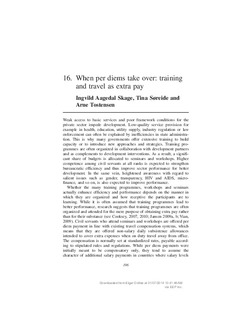When Per Diems Take Over: Training and Travel as Extra Pay
Chapter
Permanent lenke
http://hdl.handle.net/11250/2475159Utgivelsesdato
2014-03-01Metadata
Vis full innførselSamlinger
- Publications [1488]
Originalversjon
in Tina Søreide, Aled Williams: Corruption, Grabbing and Development: Real World Challenges. Cheltenham and Northamption (MA): Edward Elgar PublishingSammendrag
Weak access to basic services and poor framework conditions for the private sector impede development. Low-quality service provision for example in health, education, utility supply, industry regulation or law enforcement can often be explained by inefficiencies in state administration. This is why many governments offer extensive training to build capacity or to introduce new approaches and strategies. Training programmes are often organized in collaboration with development partners and as complements to development interventions. As a result, a significant share of budgets is allocated to seminars and workshops. Higher competence among civil servants at all ranks is expected to strengthen bureaucratic efficiency and thus improve sector performance for better development. In the same vein, heightened awareness with regard to salient issues such as gender, transparency, HIV and AIDS, microfinance, and so on, is also expected to improve performance.
